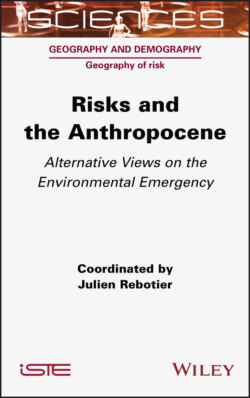Читать книгу Risks and the Anthropocene - Julien Rebotier - Страница 9
Оглавление
Foreword
Risks and the Anthropocene: A Look at the Environmental Emergency
Samuel RUFAT
Institut universitaire de France, Paris, France
Since 1980, more than 1.5 billion people have died in disasters and the UN estimates that annual damages will exceed $400 billion by 2030. Global trends of increasing exposure, high inequality, rapid urban development and worsening environmental degradation raise concerns that risk levels are becoming an impediment to sustainable development. In this context, the “migration” of the notion of the Anthropocene from the earth sciences to the social sciences has led to both hopes and controversies while polarizing attention around environmental emergencies. Are we witnessing a renewal, a refoundation or a refutation of knowledge, practices and levers of action around risks and catastrophes?
With regard to “Geography of risk”, books on this theme take stock of the renewal of concepts, approaches, issues and tools at the interface between risks, societies and the environment, because risks do not always translate into disasters and the increase in risks is not inevitable. It is possible to reduce the exposure of populations, to reduce their vulnerabilities, to support their adaptation or to support the resilience of societies in the face of risks that cannot be reduced or shared. Risk prevention, disaster reduction and mitigation of their effects require interdisciplinary approaches, in a subtle balance between the social demand for coordinated action at all levels and the imperative of reflexive criticism, in order to deal with the substance of the problems rather than the most visible symptoms or the most fashionable solutions. This book shows that, like other such notions. “The Anthropocene, even if it is deconstructed and criticized by the social sciences, seems to function as a performative category (which tends to impose a conception of the world), more than as a heuristic category (which allows meanings to emerge around conceptions and relationships to the world)”.
While scientists’ calls to action on disasters and climate are ancient and necessary, the call to the social sciences themselves remains fundamental. This book examines the shift toward the “social sciences of the Anthropocene” by showing that the imperatives of the emergency and action are engulfed in a constant deficit of reflexivity. Julien Rebotier has brought together a multidisciplinary team of French-speaking specialists, researchers and teachers, to put their expertise into dialogue. The authors offer a critical analysis of the links between risks, the Anthropocene and environmental emergencies, without glossing over the controversies and the political and ethical issues. They show in a fine way how the emphasis on climate, earth or life sciences, when social sciences are not audible in environmental research, tends to orient both the questions and the answers in a way that is not neutral: “The environmental emergency and the thinking of the whole deny the less fortunate their very status as dominated and lock them into a double punishment: they are both the most vulnerable and those whose voice counts the least (or for whom we speak the most)”.
In a concern for rigor and pedagogy, the authors first unravel the issues and approaches of the Anthropocene to propose a critical analysis in three parts: by presenting emerging risks and emergencies, then by discussing what the Anthropocene does to the concepts, themes and approaches of risk studies, and finally by questioning the possibilities of prediction, action and reflexivity in a world of uncertainty. Each chapter can be read independently. They are organized around common issues and converge to show that “the notion of the Anthropocene intervenes mostly in parallel rather than as a complement to decades of accumulated knowledge from research and action programs on risk.... First of all, reinforcement of the naturalization implied by the Anthropocene is mentioned in many places. Our gaze is focused on the threats and diverted from the issues as well as from the genesis of environmental problems”. Their analyses are illustrated by a wide variety of examples and welcome clarifications at different scales, placing the issues in relation to the concepts dealt with in other books on this theme (adaptation, management, resilience, vulnerability, etc.), without succumbing to the effects of popularity or urgency.
With this book, Julien Rebotier and his team draw up a critical prospective assessment of studies on risks and disasters and propose to provide the social sciences with a more autonomous research agenda in the Anthropocene era. They stimulate an essential reflection for a better accompaniment of societies in the face of global change, environmental degradation and the highlighting emergencies, in the perspective of a sustainable and liveable future for all.
